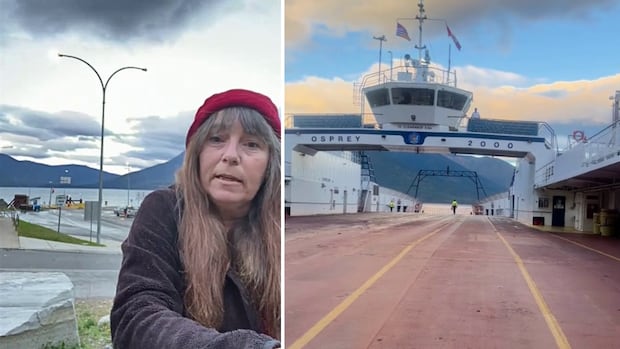Dozens of residents on the east shore of Kootenay Lake staged a protest Friday morning, voicing frustration over the impact of an ongoing job action that has limited ferry service to essential-only trips.
Gathered at the Kootenay Bay ferry terminal, protesters expressed their frustration over restricted travel options and the strain it’s placed on their lives and daily routines.
Among the protesters was Cheryl Cavanagh, a resident who relies on the ferry to visit her 90-year-old mother, who is in extended care across the lake in Nelson.
“I cannot cross the ferry to see my mum,” she told CBC News. “This past week, she’s been going through a crisis over there.
“I’m sick …it’s affecting my mum, and it’s affecting me and my family over here. I have my daughter here from Alberta who has come to see my mum,” Cavanagh added.
Her frustration reflects the challenges facing others in the community since ferry workers, represented by the B.C. General Employees’ Union (BCGEU), began striking on Sunday over what they say are inadequate pay and unsustainable working conditions.
The job action follows prolonged negotiations between the BCGEU and its employer, Western Pacific Marine.
The ferry between Kootenay Bay and Balfour now operates only three times a day on weekdays, with no weekend service, except for emergencies. This limited schedule allows only essential travellers — such as students, health-care workers, and those with medical appointments — to make the crossing.
For residents like Simon Lazarchuk from Riondel, about 10 kilometres north of Kootenay Bay, proving that his travel is essential has been challenging.
Lazarchuk, who regularly travels to Nelson’s Kootenay Lake Hospital for lymphoma treatment and medication, says being asked to show personal medical information to board the ferry feels “insulting.”
Daybreak South6:53Mixed signals; Some West Kootenay residents say the Kootenay Lake ferry strike is causing massive disruptions to their lives
Simon Lasarchuk is a retiree living in Riondel. He’s concerned about his medical privacy as the ferry strike continues.
“I told them I had an appointment, and then they said to have a note for next time,” he told CBC’s Daybreak South.
But Lazarchuk explains that most of his appointments are pre-scheduled, so he doesn’t always have paperwork on hand to present.
In a statement to CBC News, the union said, under the essential services order, workers would ask passengers to confirm their appointments but would not require sensitive medical information.
“Our members are committed to ensuring space on the ferries is available for community members who need essential service sailings,” the statement read.
The union representing inland ferry workers at seven crossings in B.C.’s Kootenays has voted in favour of job action, while one of their employers has issued lockout notice. Megan Rokeby-Thomas of the Kootenay Lake Chamber of Commerce says that means hundreds of residents who rely on the ferry could be cut off from school, jobs and services.
Odai Sirri, general manager at Western Pacific Marine, stressed that the company has not required doctor’s notes and is concerned that such practices might violate privacy laws.
“However, we have learned that the union is denying service to passengers if they ‘cannot prove’ they have a medical appointment,” Sirri said in a statement.
The company says it is now in the process of filing a complaint and application to the Labour Relations Board.
The lack of regular ferry service has forced some residents into hours-long detours over the Salmo-Creston Pass, an already challenging route that can become treacherous with snow and poor weather.
The inland ferries, which are operated by private companies but funded by the provincial government, are a part of B.C.’s highway system, acting as a bridge over certain waterways.
In the West Kootenay region, inland ferry workers are expected to begin strike action on Sunday, following weeks of failed negotiations between the workers’ union and their employers. As Corey Bullock reports, the ongoing standstill is taking a toll on residents who rely on the service.
At the protest on Friday, residents held signs saying, “Our ferry is our road” while calling on the Labour Relations Board to reconsider the essential services order and add more sailings.
According to the board, it issues the essential services order based on the arguments made by the union and the employer, who are the parties to the labour dispute.
The board, a neutral third party that oversees labour relations in the province, is urging those affected by the dispute to raise their concerns with either the union or the employer.
Western Pacific Marine and the BCGEU are scheduled to resume negotiations on Nov. 13.

